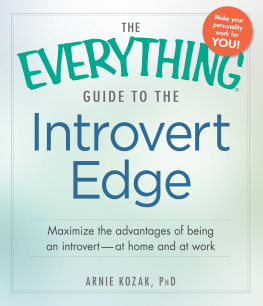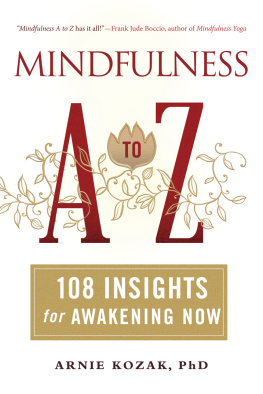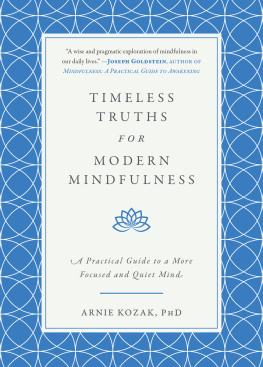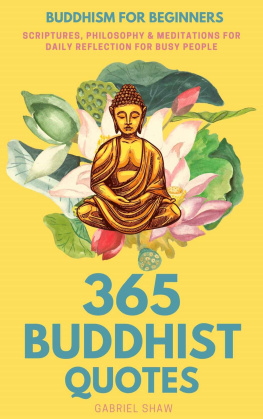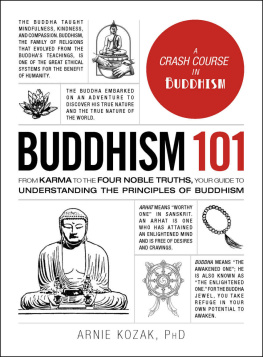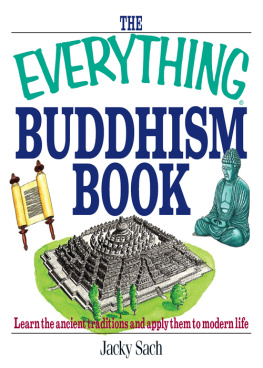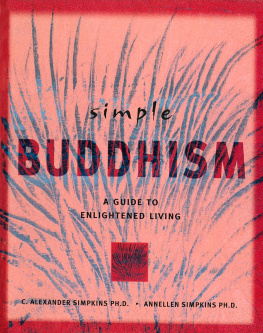Contents
Guide
Dear Reader,
A worker at my house asked me about the statue that lives on my front porch. His curiosity made me think of why I displayed a representation of the Buddha, an ancient philosopher from a culture very different from my own. I told this young man, He was a wise teacher from 2,500 years ago and his teachings helped to move humanity from a superstitious view of the world that required priests, rituals, and beliefs in order to find salvation to a self-empowered view of human development based on reason, intelligence, and goodness."
The essential teachings of the Buddha are the topic of this book and include the value of living in the present moment, understanding how wanting, clinging, and grasping influences every experience, and how insight into the power of desire can free us from much of the frustration, disappointment, and stupidity that beset human beings.
In other words, I value the Buddha because he symbolizes liberation from an ordinary and limited way of being. By aspiring to work, love, and play with these insights, I can be freer, happier, and more peaceful. I wish the same for you, Dear Reader.
Arnie Kozak, PhD
Welcome to the Everything Series!
These handy, accessible books give you all you need to tackle a difficult project, gain a new hobby, comprehend a fascinating topic, prepare for an exam, or even brush up on something you learned back in school but have since forgotten.
You can choose to read an Everything book from cover to cover or just pick out the information you want from our four useful boxes: e-questions, e-facts, e-alerts, and e-ssentials. We give you everything you need to know on the subject, but throw in a lot of fun stuff along the way, too.
We now have more than 400 Everything books in print, spanning such wide-ranging categories as weddings, pregnancy, cooking, music instruction, foreign language, crafts, pets, New Age, and so much more. When youre done reading them all, you can finally say you know Everything!

Answers to common questions

Important snippets of information

Urgent warnings

Quick handy tips
Visit the entire Everything series at www.everything.com
The Everything Essential Buddhism Book
A guide to the fundamental beliefs and traditions of Buddhism, past and present
Arnie Kozak, PhD

Avon, Massachusetts
Copyright 2015 Simon and Schuster
All rights reserved.
This book, or parts thereof, may not be reproduced in any form without permission from the publisher; exceptions are made for brief excerpts used in published reviews.
An Everything Series Book.
Everything and everything.com are registered trademarks of F+W Media, Inc.
Published by
Adams Media, an imprint of Simon & Schuster, Inc.
57 Littlefield Street, Avon, MA 02322. U.S.A.
www.adamsmedia.com
Contains material adapted from The Everything Buddhism Book, 2nd Edition by Arnie Kozak, PhD, copyright 2011 Simon and Schuster, ISBN 10: 1-4405-1028-8, ISBN 13: 978-1-4405-1028-1.
ISBN 10: 1-4405-8982-8
ISBN 13: 978-1-4405-8982-9
eISBN 10: 1-4405-8983-6
eISBN 13: 978-1-4405-8983-6
Cover image iStockphoto.com/Nisangha.
Introduction
Buddhism traces its roots back to the historical Buddha, a yogi who lived more than 2,500 years ago in northern India. The Buddha discovered a way to live that radically transformed peoples lives, starting with his own. His revolutionary insights have withstood the test of time, and his methods can still transform lives as they did in ancient India. The Buddha taught mindfulness, kindness, and compassion. Buddhism, the family of religions that evolved from the Buddhas teachings, is one of the great ethical systems that benefit humanity.
While Buddhism may be considered a nontheistic religion, it transcends religious belief into practical experience. You dont believe in Buddhism; you practice Buddhism. In fact, you dont even need to be a Buddhist to practice Buddhism. In one sense, all you have to do is sit down and meditate with openness, curiosity, and dedication.
At a time when yoga enjoyed widespread popularity, the Buddha was a prodigious yogi. He mastered the yogas of his day and then founded a way that could go beyond all suffering. This way also goes beyond words and needs to be experienced for yourself. The good news is that is available right here, right now.
Jane Hirshfield, in the PBS documentary The Buddha, offers an explanation of the Buddhas teachings in seven words: Everything changes; everything is connected; pay attention. This is a nice condensation of millions of words attributed to the Buddha in the Pali Canon. Everything changes; everything is connected; pay attention. This is the essence of the Buddhas teachings and these themes and more will be explored in this book.
Buddhism is flourishing in the West. It seems to offer a much-needed antidote to the stresses of modern life. It helps you to renovate your relationship to the uncertainty that arises because everything is changing. It offers a way to revisit your dependence on want so that you are not so beholden to things and circumstances. It facilitates feeling the connection amongst all things. And the Buddhist approach accomplishes all these things through the capacity for attention. Christians, Jews, and Muslims alike can practice aspects of Buddhism while retaining their own traditions and marking their own holidays. From celebrities to the clerk at the gas station convenience store, these vibrant traditions are capturing the hearts and minds of many. Buddhism carries within its belly the power to transform individuals, societies, and the world. It is a practice of interior and exterior revolution.
Western culture is changing the face of Buddhism, as did China, Japan, and Tibet in earlier centuries. Buddhism is not a fixed doctrine but a fluid set of ideas and practices. Wherever you are reading this book right now, chances are there is a Buddhist practice center nearby. After getting acquainted with the essentials of Buddhism in this book, you might want to visit one of these centers and try it out for yourself.
Once exotic and Eastern, Buddhism is now a common section at your local bookstore. Hundreds of titles are published each year. Buddhism is also in the news: the Dalai Lamas struggle for Tibet, political unrest in Sri Lanka, Nepal, and Myanmar, gross national happiness in Bhutan.
If you are hounded by a sense of lack, dissatisfaction, or are caught up in a web of suffering, Buddhism has something to offer you. If you are concerned about the state of the world and want to engage in conscious social action, Buddhism can give you a path. Buddhism has much to offer, and it may be just what the world needs now to save it from itself.


